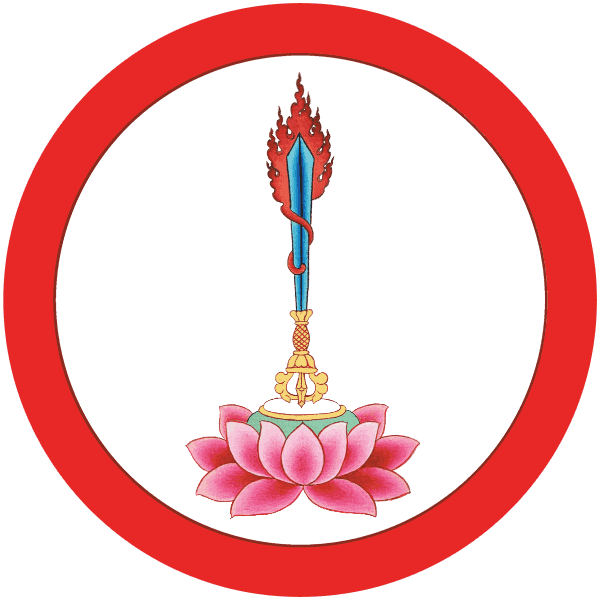
REFLECTION ON ‘OPENING THE DOORS OF OMNISCIENCE’
A talk by Jakob Leshly in November 2024 at Nelson Buddhist Centre.
In November we were treated to an evening with visiting Teacher, Jakob Leshly. Jakob has studied with Kalu Rinpoche, Dilgo Khyentse Rinpoche and Dudjom Rinpoche, as well as other eminent Teachers. He now serves Dzongsar Khyentse Rinpoche and the Siddhartha’s Intent sangha.
This was Jakob’s first teaching at our new premises, but he has treated us to his wisdom on other occasions at the Nile Street premises. What a joy he is to listen to – always so lucid and understandable, even when teaching concepts which are definitely not at entry level.
He took the full room of keen listeners on a journey of the entire path, in about an hour and a half! He based his teaching on a prayer of the great Dzogchen master Jigme Lingpa, a beautiful and profound aspiration for the path of awakening entitled ‘Entering the City of Omniscience – An Aspiration Prayer for Actualising Words of Truth’. He commented that the Prayer required a degree of trust, as it is directed towards the Vajrayana path, a path that questions our assumptions about reality. We are asked to inquire, looking at the nature of our reality, questioning that sense of ‘me’, and our misunderstandings of the nature of reality. Jakob paid homage to Amnyi Trulchung Rinpoche and reminded us of our great good fortune at NBC that we have an exponent of this living tradition as our guide and teacher.
Jakob gave us a short history of Jigme Lingpa, an 18th Century Tibetan, who claimed he was not particularly studious, but experienced many visualisations of the 14th Century Master, Longchenpa. There was a fusion of minds between these two great teachers, enabling Jigme Lingpa to write profound teachings on the Great Perfection in the form of the terma Longchen Nyingthig.
Jakob took us through the text, verse by verse, beginning with the Homage, which he described as respect and openness, honouring the Teacher as the living refuge, someone who represents the qualities we wish to invest in. Jakob pointed out how the Buddhist path demands our critical analysis. He reminded us that aspirations are made for the very best conditions on the path, taking a sense of agency in the direction of our lives, so that we can meet with the Buddha’s teachings, practice the path and meet the perfect teacher.
Jakob covered – well, everything! Buddha nature; the Three Wisdoms of study, reflection and meditation; renunciation and the four thoughts to turn the mind from samsara. The aspiration prayer spoke of building confidence in the infallibility of karma and the importance of intention. Jakob recognised the highly distracting nature of our society and how our aspirations can help us to overcome our less useful habits and impulses.
He spent some time talking about students activating the discernment necessary to connect with an authentic teacher. He warned us not to pollute that relationship with our own projections. Jakob spoke about co-emergent wisdom and the desire of an authentic teacher for the student to become autonomous, empowered. He raised smiles in the room, commenting that we have a ‘bout of samsara, and that this can be cured’; we just need to uncover our Buddha nature, which already exists within us all.’
Jakob spoke about empowerments, prayer and devotion on the Vajrayana path. The richness of the tradition and the generation and completion stages were also covered in this beautiful aspiration prayer. Jakob concluded that the aspiration prayer carried so much goodness, both the temporary wish to benefit others and to walk our own path, and also the aspiration that we attain the highest form of yoga.
For me, the evening reinforced, so clearly, that to be in the room with a teacher for a teaching has no substitute. I went home literally buzzing. Jakob was kind enough to allow the teaching to be recorded, so those present could listen again. There was so much packed into the evening, a second and third hearing were truly welcome. If you missed out this time, do make a concerted effort to hear Jakob in the future. We will be thrilled to welcome him back at NBC anytime.

CELEBRATE – OUR MEDITATION ROOM
We have all been admiring the new arrangement and additions to our Meditation room over the last few weeks. First to materialise was the door direct into the Meditation room, bypassing Reception. This enables groups who use this space for such things as yoga classes, regular meetings and so on, to share with users of other spaces with minimal disturbance. Should you have an interest in renting this room, or know like-minded folk who might, please contact us at [email protected] with details of your enquiry. We can organise a tour and a chat. The space is about 54 sq.m. gross, with a useful space of about 40 sq.m. The code on the door is exactly the same as the door to Reception.
The whole ambiance of this room has been dramatically improved with the installation of moon-disc lighting, which can be dimmed as required. The shrine is now illuminated by subtle spotlights, which remain on all the time. The effect is fabulous – warm and inviting. We have to thank Jennie Warr for her perseverence with driving this idea and, I understand, financial support, too. Keith, as always, has been active and instrumental in all the changes.
Last, but definitely not least, is the Wall of the Masters. Six wonderful photographs of teachers most significant to our lineage. Personally, I think they deserve a Celebration all to themselves, so watch this space.


MALA BEADS – THEIR HISTORY AND USAGE
What is a mala?
A mala is a string of 108 beads or seeds. The word ‘mala’ is from the Sanskrit language and translates to ‘garland’ in English [in Catholicism, a rosary is used – rosary meaning ‘garland of roses’ in Latin].
The word bead is taken from the Anglo-Saxon term ‘bede’, meaning ‘prayer’ or ‘to pray’ [some of you may be familiar with ‘The Venerable Bede who wrote the 7th Century ]
The history of the mala is rooted in Hinduism and Buddhism and dates back thousands of years. In Buddhism, a text from 4th Century BCE known as the Mokugenji Sutra tells of a King Virudaka who sought the guidance of Siddhartha Gautama’s teaching so that his people could access the wisdom of the dharma. The Sutra records Buddha’s reply:
‘King, if you want to eliminate earthly desires and to put an end to their suffering, make a circular string of 108 beads made from the seeds of the Mokugenji tree. Hold it always to yourself. Recite ‘Namu Buddha – Namu Dharma –Namu Sangha.” Count one bead with each recitation”.
‘Namu or ‘namas’ has the meaning to ‘dedicate oneself’.
Buddha, Dharma and Sangha means ‘awakening’, ‘right way of living’ and ‘community’.
Why 108?
In Hinduism, there are various associations with the number 108, including the number of sacred sites in India, the number of Vedic texts, and the number of sacred life force points in the body.
In Buddhism, the number 108 is said to relate to the 108 human passions or desires that impede enlightenment.
These are :
Abuse, Aggression, Ambition, Anger, Arrogance, Baseness, Being a know-all, Belittlement, Blasphemy, Calculation, Callousness, Capriciousness, Censoriousness, Conceit, Contempt, Cruelty, Cursing, Deceit, Deception, Delusion, Derision, Desire for fame, Deviousness, Dipsomania, Discontent, Discord, Disrespect, Disrespectfulness, Dissatisfaction, Dogmatism, Effrontery, Egoism, Enviousness, Envy, Excessiveness, Faithlessness, Falseness, Gambling, Garrulity, Gluttony, Greed, Greed for money, Grudge Hard-heartedness, Hatred, Haughtiness, Headiness, High-handedness, Hostility, Humiliation, Hurtfulness, Hypocrisy, Ignorance, Imperiousness, Imposture, Impudence, Inattentiveness, Indifference, Ingratitude, Insatiability, Insidiousness, Intolerance, Intransigence, Irresponsibility, Jealousy, Lack of comprehension, Lechery, Lust for domination, Lust for power, Malignancy, Manipulation, Masochism, Mendacity, Mercilessness, Negativity, Obsession, Obstinacy, Oppression, Ostentatiousness, Pessimism, Prejudice, Presumption, Pretence, Pride, Prodigality, Quarrelsomeness, Rage, Rapacity, Ridicule, Sadism, Sarcasm, Seduction, Self-denial, Self-hatred, Sexual addition, Shamelessness, Stinginess, Stubbornness, Torment, Tyranny, Unfriendliness, Unyielding, Vanity, Vindictiveness, Violence, Violent temper, Voluptuousness and Wrath.
The Tripitaka, the collection of Buddhist scriptures, consists of 108 volumes in some traditions, each volume representing a different aspect of the Buddha’s teachings.
Interestingly, in Jainism, 108 virtues are emphasised [perhaps the antidotes to the 108 obstructions to enlightenment mentioned above].
Symbolism and Use of the Mala
The circular nature of the mala represents the circular nature of samsara, and also interconnectedness.
The Guru Bead, at the centre of the mala, symbolises the student-teacher relationship, and acts as a reminder of divine power.
Practically, the mala serves as an aid to help focus the mind during meditation, particularly deity practice. It helps connect body [the hand with the mala], speech [the mantra] and mind [mindfulness].
More simply, it can just be an aid of mindfulness on the breath, moving a mala with each in or out breath. The particular material of the mala [gemstones, sandalwood, seeds, etc.] is sometimes chosen because of the perceived qualities of the material.
Recently, Keith Rowan has been exploring deity practice with us in his series of teachings called ‘Good Paths’. In September we have looked at Chen Rezig visualisation and mantra recitation [Om Mani Pemi Hum] for developing compassion, and Vajrasattva’s purification practice [Four Powers] which uses the mantra Om Vajrasattva Hum. If you missed these teachings and are interested in learning more, please chat with Keith on a Wednesday evening, as we would all love to hear these teachings again!
Many of the sangha have been a part of a three year Tara practice, where we have been reciting the long and short Tara mantras, as set out in our Sunday practice book. To date, collectively, we have recited the long Tara mantra over one and a quarter million times, for the benefit of all beings.
Keith recommends that you keep a note of your recitation tally if you choose a practice. Chen Rezig is an excellent way to start, and don’t be afraid to ask Keith for guidance.
You will find a beautiful array of Malas of different materials in our shop right now: sandalwood, semi-precious stone, crystal glass, and seed, and our very special amber ones. These have been sourced for us by Rinpoche’s family in Tibet.
In addition, we have locally made short malas of 21 beads and 27 beads [1/4 Mala], which are excellent for longer recitations, for when you go walking with your recitation practice, or to keep count of the number of 108 recitations you do in any session.
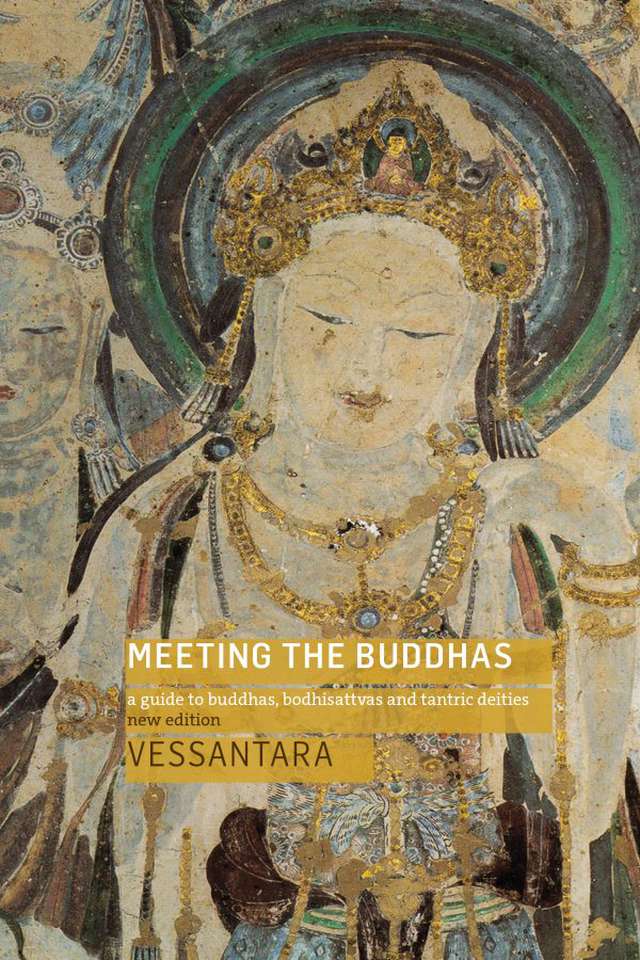
BOOK REVIEW by Jenny Beeson
MEETING THE BUDDHAS by Vessantara
Originally published 1993, Windhorse Publications Ltd, Cambridge, UK
This book review is celebrating one of my very favourite books in our library at Nelson Buddhist Centre. It was donated by a sangha member and I happened to be at the Centre when she dropped it off. I had a quick flip through it, and instantly felt drawn to the contents, which included some fabulous colour and black and white plates of deities. Books, whether donated or new, get integrated into the system by Blair, our Librarian. My impatience for the process got the better of me, though, and I made the decision to take it home with me then and there – a transgression I have never regretted, but may well have to pay for at some point!
Deity practice really appeals to me and I find I lean towards it, often at the expense of contemplation and meditation practices. It makes up the greater part of my personal practice, though I hope I manage to balance this out over time with other important practices. One of the first requests I remember making was for Keith Rowan to expand on our little yellow practice booklet [since supplanted by our Tara booklet, but which I still use every day, as it includes verses to Vajrasattva and Guru Rinpoche]. I was fairly new to Buddhist practices at this point, and was keen to get some background on the pantheon of deities mentioned therein.
Keith’s Zoom classes during Covid on our little yellow Daily Prayer Book and the King of Aspiration Prayers, [both of which are still available in our shop], were really helpful in unpacking many aspects of the practices. Vessantara’s Meeting the Buddhas looked like it was going to expand on this even more. I was not disappointed. Quite the reverse. For someone with my current level of interest, the information was really accessible and the writing style drew me in. I was offered background on sadhana practice and detail on the deities we are most likely to encounter in our early years of study and practice.
The book has a whole section exploring the Mandala of the Five Buddha Families. We meet Aksobhya, Ratnasambhava, Amitabha, Amoghasiddhi and Vairocana . Vessantara treats us to a short chapter on each, as well as setting out their attributes and affiliations in a table, for easy reference.
He next examines in some detail some of the Great Bodhisattvas, exploring Avalokiteshvara, Manjushri, Vajrapani, Green Tara, White Tara and the Eight Great Bodhisattvas. Appreciating that a book, however good it is, is never a substitute for teachings in person from our trusted teachers, good books can supplement our teachers’ teachings – especially when we have trusted spiritual friends we can discuss our discoveries and queries with.
The final part of Vessantara’s book is dedicated to Tantra and Tantric Deities. The Tantra was never shared widely in our tradition, so enjoy this part of the book as an inquiry into practices and deities which definitely need person to person instruction. This is where a trusted teacher, sangha and Dharma Centre give essential support and instruction - in ways which the written word never can.
After a couple of years of more-on-than-off re-borrowing of this fabulous book, I finally did what I needed to do and got a personal copy. It was republished in 2022, so clearly I am not the only one enjoying Vessantara’s work. I hope you enjoy Meeting the Buddhas as much as I have.
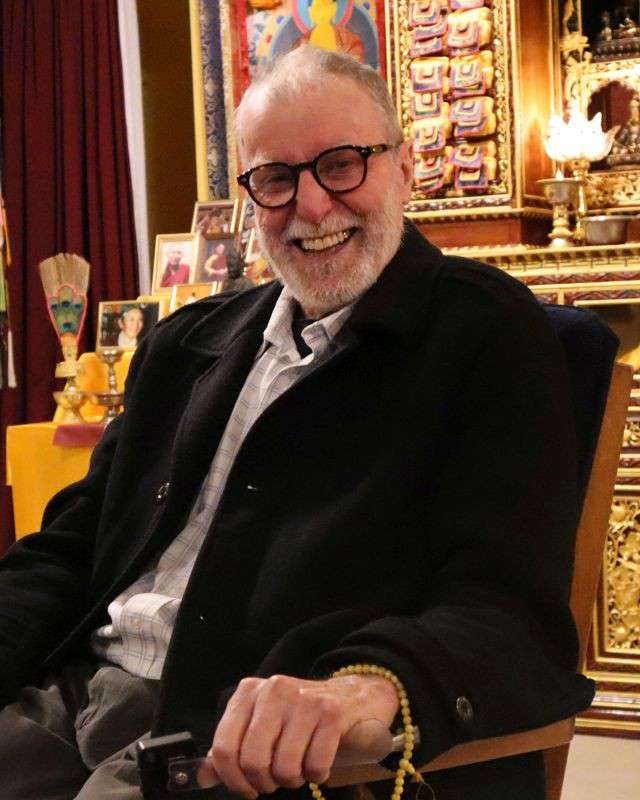
REFLECTIONS ON WEDNESDAY BUDDHIST VIEW SESSIONS
For many of the past and present sangha, as well as for travellers temporarily in Nelson, their introduction to Nelson Buddhist Centre, if not to Buddhism itself [in this lifetime, anyway], is through Keith Rowan’s teaching sessions on Wednesday evenings. Keith has been running these sessions at NBC for around twenty years. They even have a precursor: sessions at his own home in Nelson, before the NBC existed. He’s been a student of the Buddha’s teachings since his 20’s and has a wealth of understanding of those teachings and their application in everyday life experiences, which only deepens with time, study and practice.
When our time at the premises in Nile Street was coming to a close last year, we began recording our thoughts about the Centre’s influence on our lives, and it was interesting to see how much Keith’s classes had impacted many of us. Here’s one quote:
“My NBC reflections always come back to the “Keith Wednesdays”. (I suspect I will always refer to this day of the week as such, even when Keith has long gone). Unravelling the Buddhist teachings - where you can then go forward to face the day-to-day, moment-by-moment, armed with a very practical set of tools - is a corner stone of Dharma grass roots/rubber hits the road type of learning to me. This is where Dharma learning happens for me. If I think of nothing else I think of impermanence and to never, never, NEVER, NEVER give up. I think of having good humour and facing life with interest and with infinite kindness, pausing and breathing, of no expectations, of generosity, of turning the mind away from negativity, watching our habitual patterns, keeping an eye on the basics, what outcome each mind state creates… and oh so much more.” (Jennie Warr, 2023)
Keith’s classes have been a staple of my week since I first walked in the Nile Street red door. There have been some variations in format over the years I’ve attended these Wednesday evening sessions. I’ve seen him tackle big bodies of work, such as the lojong slogans for training the mind – a difficult undertaking when new faces appeared each week. He’s run the session purely using questions raised by attendees, so very off-the-cuff, as he asserts that no questions are off the table. Keith has also run series of evenings on a common theme, building up the teaching over a number of weeks, always accommodating new faces with a bit of a catch-up on the theme so far.
This July, and perhaps beyond, he is incorporating another technique – that of a more circular seating format, with the intention that we all bring our questions, listening skills and suggestions to this forum. We have the overarching theme of ‘Family Business’ – but then, what could possibly be excluded from that? Each of us have an experience of family in its many forms, after all, and yet those experiences will have similarities and also their uniqueness. Even after just the first week, with its ‘starter’ on exploring the challenges of sibling relationships, I can see that it’s going to be infinitely rewarding to be a part of this series. Contributions from our Zoomers, as well as those in the room, were just so interesting.
A word of warning and reassurance. Keith is not recording these sessions, because of their very personal nature. If you wish to benefit from the discussions, you need to be present, either as a ‘Zoomer’ or ‘Roomer’. I really do recommend you be present, because we all have so much of life’s experiences we can offer insights from, we’ve all experienced the difficulties that life in samsara throws at us, and I think we all appreciate the comfort that comes from knowing we have support on this journey.
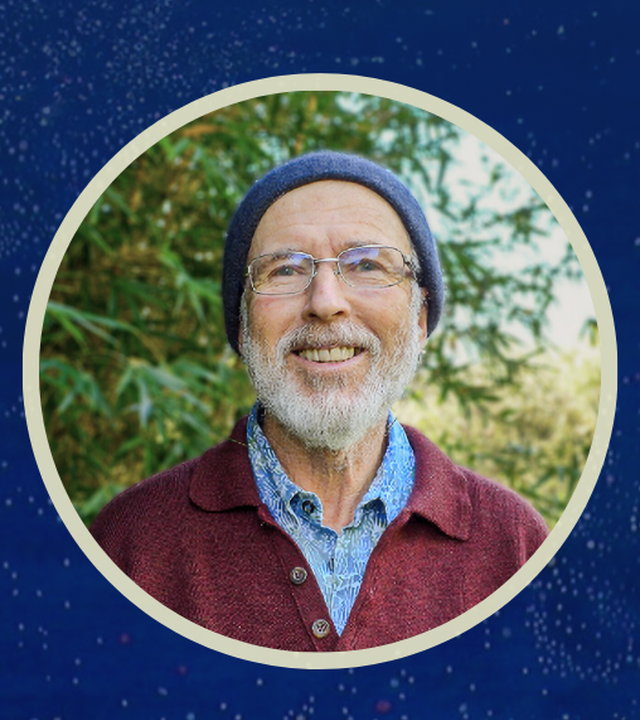
TARCHIN’S RECENT TEACHINGS AT NBC
A highlight for us all in April was Tarchin Hearn’s weekend of teaching. Having just completed a retreat at Wangapeka Retreat Centre, it was a supremely generous act to offer us two weekend teachings.
Our new Centre is proving to be a warm and inviting space for visiting teachers and students alike. Tarchin’s teachings were well attended and the shrine room pleasantly full. There is no substitute for being present in the room, as these occasions are immersive activities, whole body-mind experiences for teachers and students alike.
We’ve probably all experienced occasions in teachings, when the teacher appears to be teaching directly to us, and it was delightful to sit with a sangha member who had just asked a question about breathing and walking meditation. Tarchin illustrated his answers with a reference to the loss of a wallet – my friend’s wallet had been misplaced that morning!
Tarchin suggested four supports for walking meditation:
1. The breath.
2. Smiling [checking eye tension] – smiling in all parts of the body.
3. Appreciation of the body moving in space.
4. Recognise that each footfall is supported by/takes the life of numerous beings.
Walk at your right pace with the right flow – fluid and pleasurable. Occasionally stop and use all the senses – appreciating, breathing in, breathing out, relating to…
What follows are a few more take-aways from Tarchin that weekend:
Trade ‘I’ for ‘we’
Sentience is sensitive responsiveness
Meditation is a lifelong journey of attunement
Relating is non-negotiable
Refuge – feeling welcome
Dukkha – off-centre – Tarchin talked at some length about ‘truing our dharma’ much as one trues [centres the hub of] a wheel. The Middle Way – centred.
He talked of the two works of a bodhisattva – working in the lab [exploring] and in the hospital [on difficult days] and that they/we are always on call.
There were so many beautiful teaching moments and it was an absolute honour to be in the room together.
Tarchin left us with his blessing for Nelson Buddhist Centre:
A Blessing of Remembrance
for the Nelson Buddhist Centre and all who teach and study there
Dharma is easeful resting.
Dharma is moving in heartful confidence.
Dharma is utter interbeingness.
Dharma is a pathless land –
It is also a landless path.
Dharma is walking - completely in step – savouring
the vast mystery becoming.
Dharma is remembering the blessing of mindful breathing
when conflict and disharmony abound.
Dharma is not rushing – don’t worry, death is always on time
- you won’t be late!
Dharma is letting go
falling into love
a flowering of presence
into presence.
Dharma is my friend
is
thus.
AHHHH!
May the N.B.C. become
A sanctuary for all in need
A place of healing and meaningful learning.
A place for meditation and remembrance
A jewel of peace and beauty,
reflecting the great mystery of nature-in-process.
And an open door to love and clear seeing
for all beings
This is my heartfelt wish.
Tarchin 6/4/24
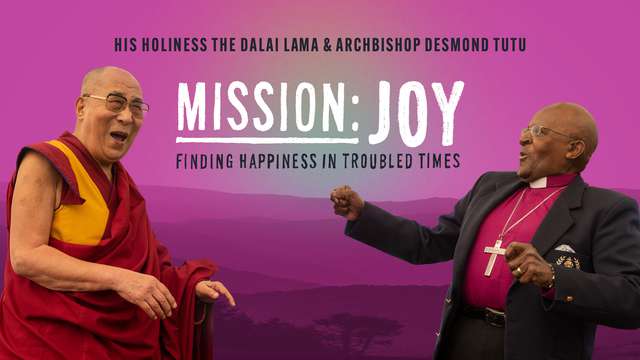
MISSION JOY – FINDING HAPPINESS IN TROUBLED TIMES
What a perfectly titled movie this is. This celebration of the relationship between H.H. the Dalai Lama and Archbishop Desmon Tutu was such a joy to watch. We witnessed a most special friendship, forged over many years, between these two outstanding emanations of true compassion and joy.
We learned much about both of their earlier lives – for me His Holiness’s was the more familiar of the two, so it was intriguing to see how such wildly different early years and very different outer trappings in their lives, could result in such parallels in the hearts and minds of these beings. That the apparent tragedies and difficulties of their lives could bring about the astonishing transformations in society makes one truly grateful to have lived through some of these years oneself. To be instruments of such very needed changes – to the world view and attitude to apartheid on the one hand, and the absorption of Buddhist philosophy in the West on the other, are such monumental achievements in the lives of these remarkable men.
Although we can put heroes on pedestals, it was humbling to witness the very human qualities of these men unfold in their interactions and conversations. We needed tissues. There were not too many dry eyes in the room by the time the movie was over, believe me, which made watching it together all that more enjoyable.
Thanks, Andrea, for initiating and organising this showing.
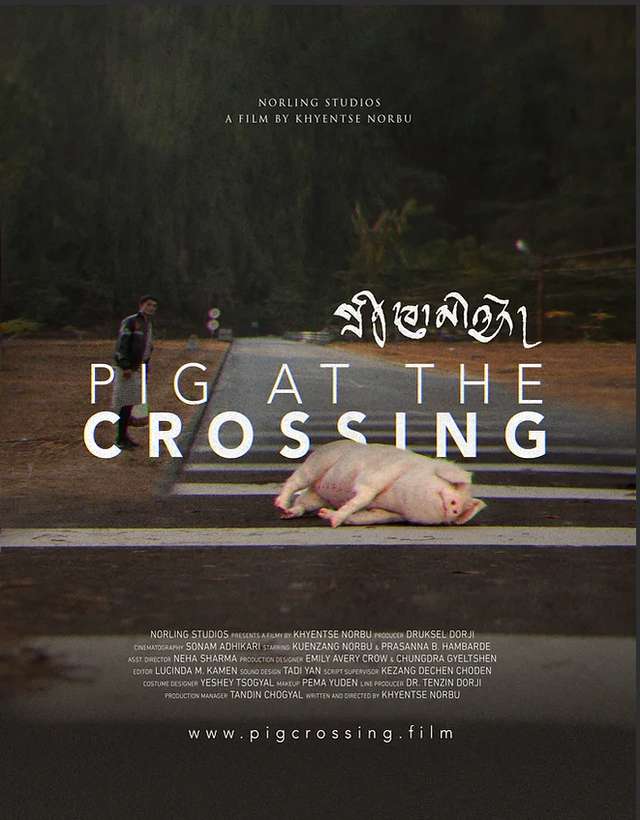
PIG AT THE CROSSING
It was an intriguing title, and anything put out by Khyentze Norbu [Dzongzar Khyentze Rinpoche] is always going to be intriguing, at the very least.
This was definitely a movie for Buddhists, as there were so many references, both subtle and more obvious. I’m sure I missed many of them and some have been realised on the back-burner. Why ‘Pig’ for instance? Those quicker than me would have got the reference to the inner circle of the Wheel of Life and the Pig denoting ignorance. But it’s fun when the penny finally drops!
We were so pleased that this ‘once-only showing’ was subsequently made available a second time; Andrea was pro-active in suggesting we watch the movie together at NBC, and we did this after Prayers, the first Sunday in June – a busy day, as we had Rinpoche’s teaching almost directly afterwards. Something of a feast!
The storyline took us through a young man’s sudden death and his confusion in the bardo – not realising that he was actually dead, despite the strangeness of the proceedings unfolding before his eyes [essentially his family’s response to his death]. Unfinished business underpinned his attachment to his former life and the difficulty he had in moving through the bardo experience, despite the guidance that appeared. It was easy to empathise with his confusion – who of us wouldn’t have unfinished business if we died suddenly? It was a good reminder to keep our own lives and affairs tidy and as wholesome as possible, especially relationships.
This is a movie that is never going to grace the big screen, but if it becomes available again and you didn’t catch it this time, make the effort to see it. Time well spent.
